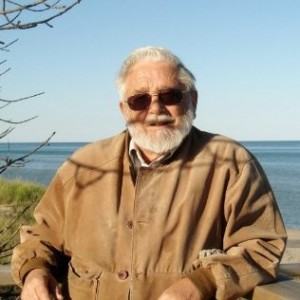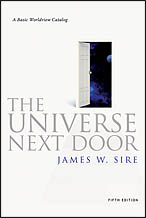
Last week, the Emerging Scholars Network began a James W. Sire Worldview Question-and-Answer series with Is Atheism a Worldview? As I have considered the development of Sire’s thought on worldview, I continue to be struck by the importance of life story, see Jim Sire: Excerpt from “Rim of the Sandhills“.
Question 2:
“Is there still a place for propositional logic in apologetics or worldview studies?” — John
James W. Sire’s response:
“Of course, there is. Postmodernism, however you define it, is filled with propositions which are either true or false or confused. Only careful logical thinking will get us close to an understanding of what “postmodernism” itself is. Any claim made by any worldview requires rational thinking to understand let alone to determine if it is worthy of belief. The principle of non-contradiction is assumed by every coherent proposition.

Let’s take these two propositions; the second explains the first: “There is no substantial self; human beings make themselves who they are by the languages they construct about themselves” (definitional point No. 5 in my chapter on postmodernism in The Universe Next Door: A Basic Worldview Catalog 5th edition, p. 226). Whatever this proposition means requires rational thought involving the principle of non-contradiction to understand. And even more rational thought to determine if it is true, false, or confused.
If postmodernism says that it is not possible to determine the “truth,” “falsity” or “confusion,” of the proposition, then that too is a proposition that is either true, false or confused. If postmodernism attempts to get out of this trilemma by saying, the only way to determine the truth is whether application of the idea gets you what you want, then what you want must be understood or you will never know whether you got it or not. The principles of logic (A is A; A is not not-A; B is either A or Not-A) must hold or one is simply speaking non-sense. Actually, we probably get away with speaking lots of nonsense, but not when it comes to when we are in the middle of a street and we think we see a bus heading rapidly toward us. No one lives as if we construct reality by our language. No Buddhist or New Ager who meditates regularly in the middle of a busy intersection, lives long enough to construct much reality.
No one lives as if there were no determinate truth. In Why Should Anyone Believe Anything at All? I tried to show in the opening chapters that everyone actually wants to know the truth. They may say that they can believe anything they want, but when one asks them whether wanting something to be so makes it so, they generally recognize that believing in reincarnation doesn’t mean that it is necessarily what will happen to them at death; they come to see that the only way they can justify their fundamental beliefs requires weighing evidence and checking on coherence–in short, doing worldview thinking. Aristotle is still correct: “All men by nature desire to know.”
In the 80s and 90s many times I gave a one-lecture version of “Why Should Anyone Believe Anything at All” in which I really do think that students realized that their affirmation of “I’m OK. You’re OK. And that’s OK” just isn’t OK. They realized this as I led them through the “reasons” they say they believe to see that most of them are not good reasons by their own measure of a good reason. They saw that a good reason leads to the determination of the truth, not a linguistic construction of reality.
The recent emphasis on building culture as a better way to express the Christian faith than just having an intellectual worldview is, of course, correct. What is not correct is that knowing what kind of culture is truly an expression of Christian faith is possible without thinking. What kind of art, music, organizations, actions are truly Christian? You can’t answer that without thinking in worldview terms, though that seems to be the “thinking” of several recent critics of Christian worldview thinking.
One doesn’t have to present the Christian faith via a sequence of logically linked propositions. It is also appropriate to point to situations, events, narratives, experiences with nature and, perhaps, a host of other non-propositional elements, some of which help seekers to “see” that some proposition about reality is really true. But to disdain, reject or forget forget logic is to forget intelligence. One’s way to the truth may not be able to be understood by rational analysis, but the truth itself will have a good deal of rationality about it. In theological terms it will be a “word” made “flesh,” that is, a concept realized in creation.”
Once again, Thank-you to Jim for addressing a worldview question which has been raised by a member of ESN. A few follow-up questions for your consideration:
* Have you had similar conversations?
* If so, how have you responded?
* How do you enter such dialogue in on-line interactions?
Do you have a question for Sire regarding worldview? If so, please email Tom so that we will have a 3rd, 4th, 5th question for the series. If you desire, we are more than willing to attribute the question to Anonymous. A second excerpt from Sire’s autobiography Rim of the Sandhills will be posted tomorrow. Don’t miss it!
Updated profile picture/caption. 11/12/2012. 11:21PM CST.
Tom enjoys daily conversations regarding living out the Biblical Story with his wife Theresa and their four girls, around the block, at Elizabethtown Brethren in Christ Church (where he teaches adult electives and co-leads a small group), among healthcare professionals as the Northeast Regional Director for the Christian Medical & Dental Associations (CMDA), and in higher ed as a volunteer with the Emerging Scholars Network (ESN). For a number of years, the Christian Medical Society / CMDA at Penn State College of Medicine was the hub of his ministry with CMDA. Note: Tom served with InterVarsity Christian Fellowship / USA for 20+ years, including 6+ years as the Associate Director of ESN. He has written for the ESN blog from its launch in August 2008. He has studied Biology (B.S.), Higher Education (M.A.), Spiritual Direction (Certificate), Spiritual Formation (M.A.R.), Ministry to Emerging Generations (D.Min.). To God be the glory!

I like how he unfolded the logic. I’m going to have to check out that book.